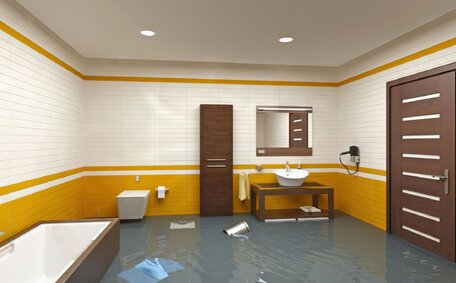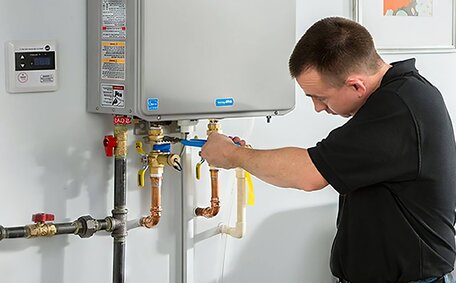
Signs Your Hot Water System Is Failing
Common signs your hot water system is failing include strange noises, rust, leaks, inconsistent temperature and pressure. Call our licensed plumbers if you notice these issues for repairs.
Read MoreDirect water heaters raise the temperature of water by directly exposing it to an open flame or heating element, subsequently transferring the warmth to your home’s water system. The flame or element effects direct heat upon the water flowing through the heater, similarly to how certain systems use air for heating purposes. Common types heaters include storage tank water heaters, integral to a household’s water supply, tankless models, and solar water heaters.
Indirect water heaters involve an external heat source, such as a boiler, transferring heat to the water through a heat exchanger within the system. Indirect systems are often linked to the main furnace like a boiler, and are closed-loop, making more available hot water without combustion byproducts mixing with the potable water.
Although direct water heaters possess some advantages, indirect systems use a separate heat transfer fluid, often yielding higher energy efficiency. They commonly incorporate an electric heating element or gas burner within an insulated tank, part of the storage or heating unit, which contrasts with the less visible operation of indirect methods.
Cold inlet water, indicative of typical household water use, passes into the water tank or chamber and comes into contact with the open flame heating source, which then efficiently transfers its heat energy to rapidly deliver warm water to your water outlets.
Models that use natural gas maintain a consistent supply of hot water in a gas-fuelled tank. The heating elements or burners can run in cycles to uphold the set temperature, ensuring the perfect warmth awaits when you open your hot water tap. Tankless coil heaters offer a continuous flow and can satisfy less hot water demand by instantly activating their heating element only when hot water is drawn through the system.
Direct heaters without storage tanks save space in enclosed areas, exemplifying the trade-offs between different water heating system configurations.
Direct fired heaters, especially gas models, often achieve higher energy efficiency owing to the lack of heat-exchanging components found in indirect heaters. However, if water softening is not used, increased energy use may lead to hard water deposits, corrosion, and contamination risks from combustion byproducts in gas-fired heaters. Proper maintenance is crucial for their longevity and safe operation.
Direct water heating systems come with several benefits, including lower bills and improved heating efficiency:
The difference between direct and indirect water heaters is evident as indirect fired heaters use a heat exchanger connected to an external heat source like a boiler or furnace. The heat source heats water, glycol, or another heat transfer fluid that flows through the heat exchanger. This heated fluid transfers heat through the walls of the heat exchanger to a separate supply of potable water flowing through the inside of the coils.
Since there no direct mix between the heating fluid and potable water, indirect hot water systems deliver a hygienic closed-loop system for heating water. Indirect hot water achieves greater efficiency by utilising waste heat from the furnace boiler that would otherwise escape through the flue.
The use of an external boiler for space heating illustrates how indirect systems can multitask, providing both home heating and water heating.
Indirect water heaters, designed as efficient heating appliances, maintain a consistent supply of warm water in an insulated storage tank, ready for use. Their closed-loop system prevents mineral buildup and corrosion, ensuring a quality hot water output. By supplying domestic hot water efficiently, they eliminate the need for an additional heater, reducing operating costs.
Indirect water heaters can offer several key benefits, including less maintenance:
Indirect systems provide evenly heated water with fine temperature control, and their storage tanks maintain a plentiful reserve for when demand peaks. Their lengthy lifespan and maximised energy efficiency mean these heaters can offer significant savings over time, outweighing their higher initial investment for both residential and commercial uses.
Regarding energy efficiency, direct water heaters generally outperform others. An electric hot water system heats water directly with an electrical element or gas burner, converting an impressive proportion of the fuel’s heat energy directly to warming the water, achieving 98-99% efficiency.
Indirect systems use a heat exchanger connected to a furnace or boiler to minimise heat loss, reaching 80-90% efficiency. Despite some heat loss in the transfer process, they improve household efficiency by recycling waste heat from existing systems.
In terms of costs, the difference between direct heaters and other systems is that direct heaters tend to have lower initial purchase and installation costs given their simple and compact construction. But indirect systems generally last much longer - over 20 years compared to 6-10 years for direct units. The closed-loop design better resists corrosion and mineral buildup.
For long-term perspectives, an indirect system might emerge as the better choice with its potential for savings and a prolonged service life, despite its higher initial expense. By tying into your home’s heating system, it can also reduce operating costs. Assessing hot water needs and fuel access is crucial for selecting the most economical system.
Installing direct water heaters is often more straightforward than indirect ones due to fewer parts. A skilled plumber can fit a tank or tankless model in your home within a day, by linking cold water intake and hot water output pipes to the gas or electric supplies and arranging adequate ventilation.
Indirect or solar hot water systems involve a more intricate setup, integrating a storage tank, heat exchanger coil, sensors, and circulation pump with the home’s heating system. This installation usually spans 2-3 days and necessitates collaboration with an HVAC technician for seamless integration with your current boiler or furnace.
In terms of maintenance, direct heaters require regular inspections to assess burner function, air flow, appropriate ventilation, and carbon monoxide levels. Periodic tank flushing to avert sediment accumulation is essential. For indirect systems, while the main heat exchanger is typically durable, components like sensors, pumps, and valves require routine checks for scale or wear.
Given their lower installation expense, direct heaters demand thorough maintenance for safe and optimal functioning. Conversely, indirect systems have higher initial costs but entail less upkeep in the long run, operating efficiently for over two decades with minimal component monitoring. Both types ought to be installed and maintained by certified professionals only.
Indirect hot water heaters, compatible with high-efficiency boilers, have the potential to curtail greenhouse gas emissions and lessen dependence on the grid, although the manufacturing of additional system parts must be considered in their environmental evaluation.
In locales where fossil fuels are the main energy source, a gas-fired direct heating unit or an indirect heater coupled with renewable or geothermal energy sources might present an optimal balance by countering emissions elsewhere within the energy grid.
In areas with clean power sources, combinations of gas and electricity or tankless water heaters might turn out to be the better environmental choice. Selecting the greenest option ought to align with your circumstances and the regional energy landscape.
Nonetheless, for such water heaters to function at their best, they must be situated in a location with ample space and abundant sunlight.
Deciding on a hot water system for your Marrickville residence involves weighing factors including family size, local climate conditions, water usage patterns, available fuel options, expenses, and environmental consequences.
Conversely, small households with constrained space might gain more from a space-saving, tankless direct hot water system; however, their limited output isn’t ideal for large families or scenarios with high demand. In regions where electricity is affordable and environmental-friendly, efficient electric tankless models running independently could minimise emissions effectively.
Despite requiring more room, these systems also function efficiently in colder climates.
Tanks paired with high efficiency gas boilers, heat pumps or solar water heating systems can maximise efficiency while minimising environmental impact. Larger households with high demand often benefit more from indirect systems with storage tanks that ensure ample hot water capacity.
When it comes to costs, direct heaters have lower purchase and installation costs while indirect systems cost more upfront but save on energy and maintenance over a 20+ year lifetime. Careful hot water usage analysis helps determine the optimal system for your home.
For personalised advice on the right water heating system for your Marrickville home’s specific needs, contact the friendly, qualified staff at Marrickville Plumbing today on 1300 349 338 or email us.
As trusted local plumbers since 2001, we are happy to discuss directfired heaters as an option to help find your ideal solution.
Common signs your hot water system is failing include strange noises, rust, leaks, inconsistent temperature and pressure. Call our licensed plumbers if you notice these issues for repairs.
Read MorePipe relining is an eco-friendly alternative to pipe replacement that uses materials like epoxy resin to repair pipes without digging. It produces less waste and emissions than traditional methods. Learn about the environmental benefits of trenchless pipe relining.
Read MoreReplacing an outdated electric, gas or solar hot water system with a more efficient heat pump or solar model can significantly reduce your energy bills and carbon footprint. Take advantage of available rebates. Contact us to retrofit your old system today.
Read MoreMarrickville, 2204 NSW
We will call back as soon as possible.




